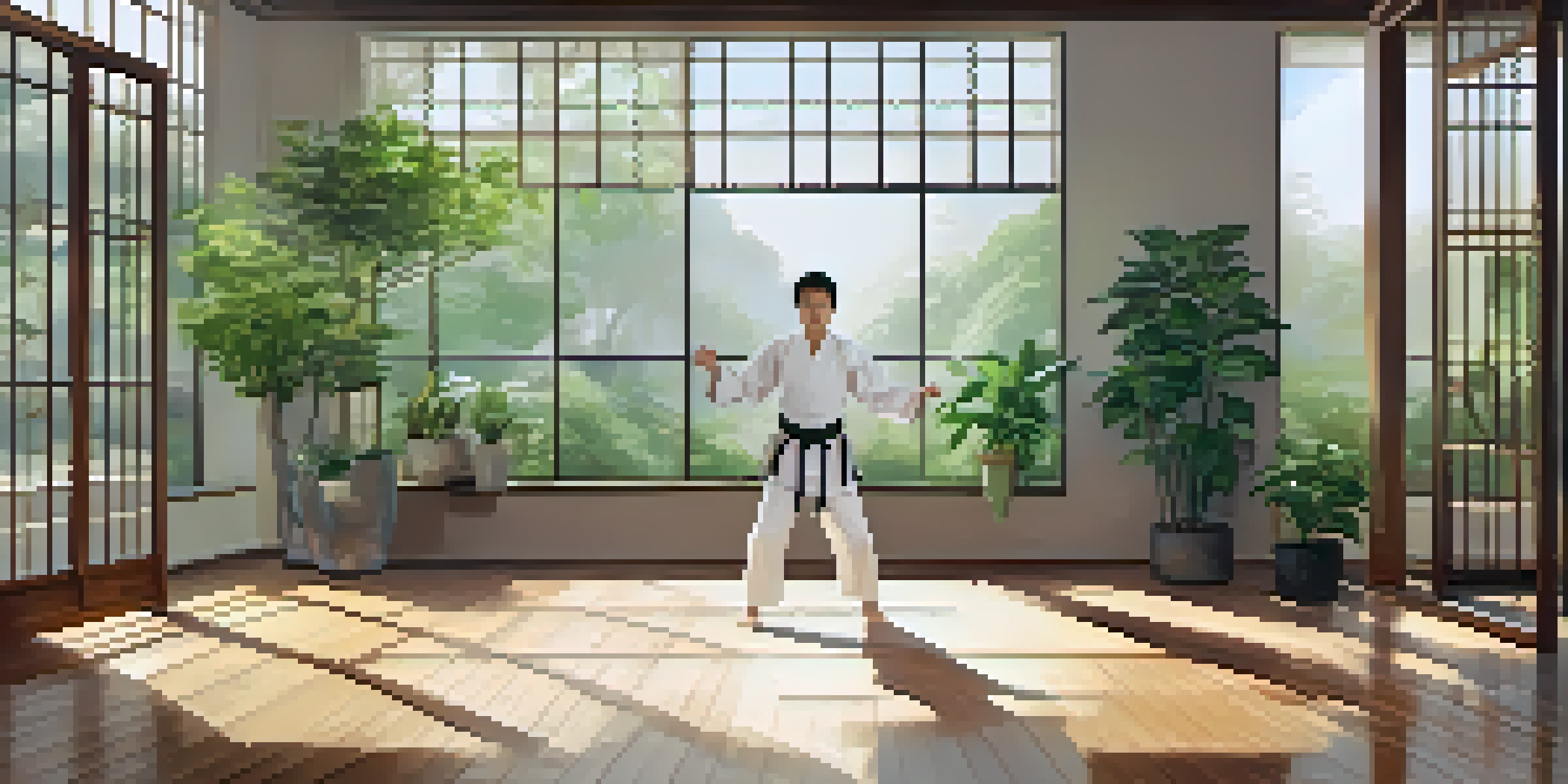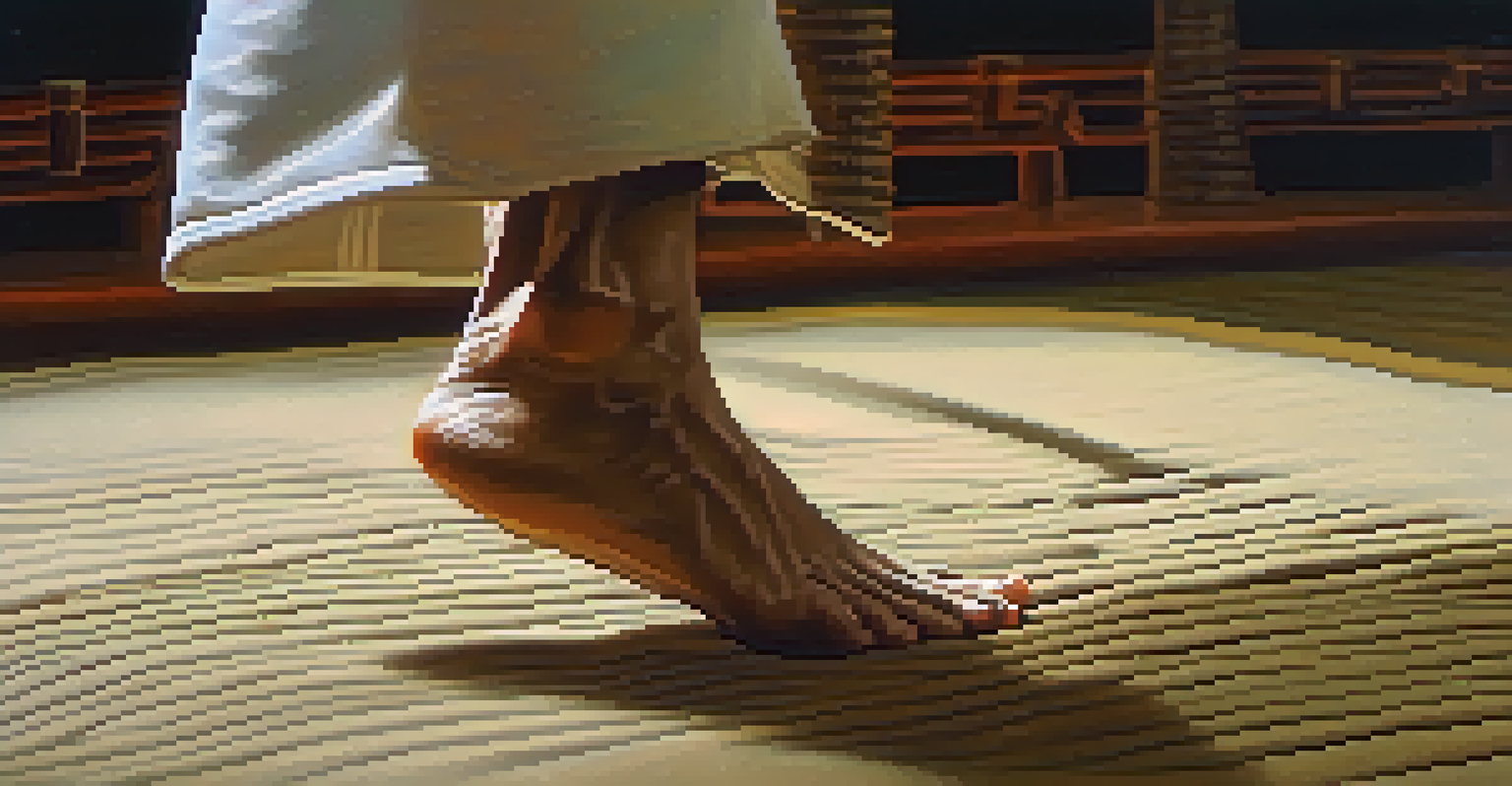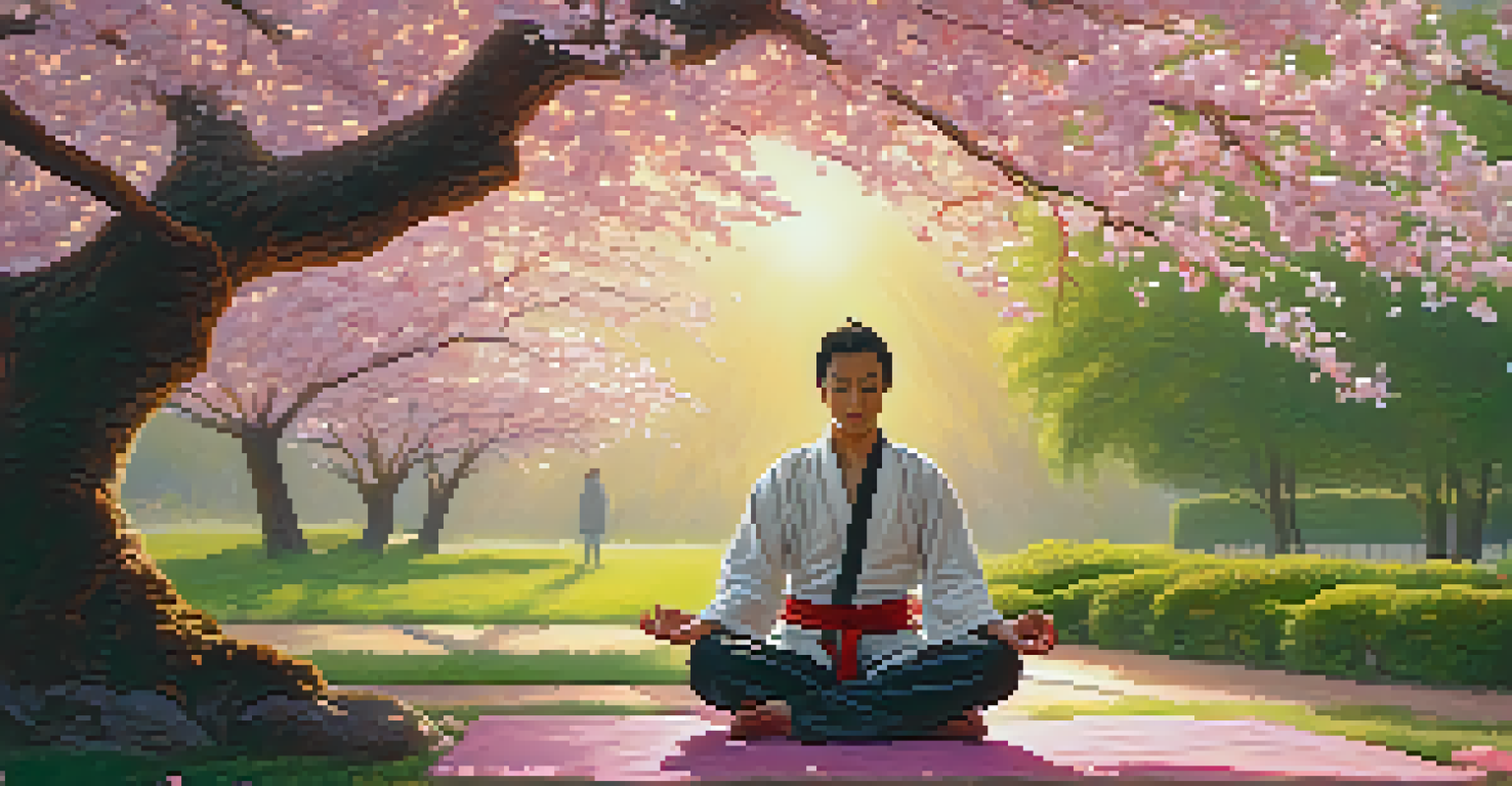Mindfulness and Meditation: Enhancing Martial Arts Practice

Understanding Mindfulness and Meditation in Martial Arts
Mindfulness and meditation are more than just buzzwords; they form the backbone of a focused martial arts practice. Mindfulness involves being fully present in the moment, while meditation is a technique to cultivate that awareness. Together, they can transform your training sessions into profound experiences that go beyond physical movements. Imagine stepping onto the mat and being completely aware of your breath, your body, and your surroundings—this is the essence of mindfulness.
The mind is everything. What you think you become.
In martial arts, every strike, block, and movement can become more intentional when you practice mindfulness. It allows you to connect deeply with your techniques, enhancing your overall performance. For instance, a martial artist who meditates regularly may find that their ability to execute complex techniques improves significantly, as they are more tuned into their body's needs and responses.
Moreover, integrating mindfulness into your practice can help reduce stress and anxiety, common challenges for many martial artists. When you focus on the present rather than worrying about past mistakes or future competitions, you create a mental space conducive to growth. This shift not only enhances your physical abilities but also fosters a more resilient mindset.
The Benefits of Meditation for Martial Artists
Meditation offers numerous benefits tailored specifically to martial artists. One of the most notable advantages is improved concentration. By training your mind to focus during meditation, you can carry that heightened awareness into your martial arts practice, leading to better decision-making in high-pressure situations. Imagine facing an opponent and having the clarity to anticipate their moves—this is what meditation can help you achieve.

Additionally, regular meditation practice can cultivate emotional regulation. Martial artists often face intense emotions during training or competition, and meditation equips you with tools to manage these feelings effectively. For example, instead of reacting impulsively during a sparring session, a meditator might pause, assess the situation, and respond with calculated precision.
Mindfulness Enhances Performance
Practicing mindfulness allows martial artists to connect deeply with their movements, improving focus and execution.
Finally, meditation aids in recovery and injury prevention. The ability to relax deeply allows the body to heal and rejuvenate, which is crucial for athletes. When you combine meditation with your martial arts training, you're not just sharpening your skills; you're also taking care of your body and enhancing your longevity in the sport.
Incorporating Mindfulness into Your Training Routine
Integrating mindfulness into your martial arts training doesn't have to be complicated. Start with simple practices like mindful breathing before your sessions. Taking a few moments to focus solely on your breath can ground you, making it easier to enter a training mindset. Picture this: before stepping onto the mat, you take a deep breath, feel the air fill your lungs, and let go of any distractions—this sets a powerful tone for your practice.
Meditation is not a way of making your mind quiet. It’s a way of entering the quiet that’s already there—buried under the 50,000 thoughts the average person thinks every day.
Another effective way to incorporate mindfulness is through focused movement. During your drills or forms, pay close attention to each motion, the sensations in your body, and how your energy flows. This approach not only enhances your technique but also deepens your connection to the art itself. Think of it like a dance; the more you engage with the rhythm of your movements, the more fluid and powerful they become.
Lastly, consider ending your training sessions with a short meditation. This can be as simple as sitting quietly for a few minutes to reflect on what you learned, or visualizing your techniques. Such practices can help solidify your training in your mind and prepare you for future sessions, making every moment on the mat count.
The Role of Visualization in Martial Arts
Visualization is a powerful tool that complements both mindfulness and meditation in martial arts. It involves creating mental images of success, technique execution, or even sparring scenarios. By visualizing these moments, you can enhance your performance and prepare mentally for challenges ahead. Consider a fighter visualizing their movements before a match, feeling the confidence radiate through their body.
This mental rehearsal not only builds confidence but also reinforces muscle memory. When you imagine performing a technique flawlessly, your brain activates the same pathways it would use during actual practice. This means that visualization can serve as an effective supplement to physical training, allowing you to refine your skills even when you’re not on the mat.
Meditation Cultivates Emotional Control
Regular meditation helps martial artists manage intense emotions and enhances decision-making during high-pressure situations.
Moreover, visualization can help calm nerves before competitions or challenging training sessions. By picturing yourself succeeding, you create a sense of familiarity and control, reducing anxiety. It’s like preparing for a big presentation; the more you rehearse in your mind, the more at ease you feel when it’s time to perform.
Mindfulness in Sparring: Staying Present Under Pressure
Sparring can be one of the most exhilarating yet challenging aspects of martial arts. It’s easy to become overwhelmed by the fast-paced nature of the practice, but mindfulness can help you stay grounded. By focusing on the present moment during sparring, you become more attuned to your opponent's movements and your own responses. This awareness can lead to more strategic decision-making.
For instance, when you practice mindfulness in sparring, you may notice patterns in your opponent’s attacks that you might otherwise overlook. This insight allows you to anticipate their moves and respond effectively, turning potential threats into opportunities. Imagine being able to predict your opponent’s next strike and counter it with precision—this is the power of mindfulness.
Additionally, mindfulness can aid in managing the emotional highs and lows that come with sparring. Instead of letting frustration or anxiety cloud your judgment, being present helps you accept each moment as it comes. This practice not only improves your performance but also fosters a sense of camaraderie and respect for your training partners.
Creating a Mindfulness and Meditation Space
Having a dedicated space for mindfulness and meditation can significantly enhance your practice. This doesn't have to be a large area; even a small corner of your home can serve as your sanctuary. Choose a spot that feels calming and inspiring, perhaps adorned with items that resonate with your martial arts journey, like your gi or a favorite belt.
Make this space inviting by adding elements that promote relaxation—think cushions, soft lighting, or even calming scents. Creating a pleasant environment can motivate you to engage in mindfulness and meditation regularly. Consider it a personal retreat where you can escape the hustle and bustle, allowing you to recharge and refocus.
Visualization Boosts Confidence
Using visualization techniques can reinforce muscle memory and calm nerves, leading to improved performance in competitions.
Finally, establish a routine around your mindfulness space. Whether it’s a few minutes of meditation before training or a dedicated session once a week, consistency is key. Over time, this space will become associated with tranquility and focus, making it an integral part of your martial arts journey.
The Long-Term Impact of Mindfulness and Meditation
The benefits of incorporating mindfulness and meditation into your martial arts practice extend far beyond the dojo. These practices lay a foundation for mental resilience, helping you face life’s challenges with a calm and collected mindset. As you cultivate these skills, you may find that your overall well-being improves, leading to a more balanced life.
Moreover, the lessons learned through mindfulness and meditation can enhance relationships outside of martial arts. The ability to listen, empathize, and remain present in conversations becomes second nature as you develop these skills. Picture having deeper connections with friends and family because you’ve trained your mind to be more engaged and attentive.

Ultimately, the long-term impact of these practices can transform not just your martial arts journey but your entire life. By fostering a mindful approach, you’re not just building skills; you’re cultivating a way of being that enriches every aspect of your existence, allowing you to thrive both on and off the mat.